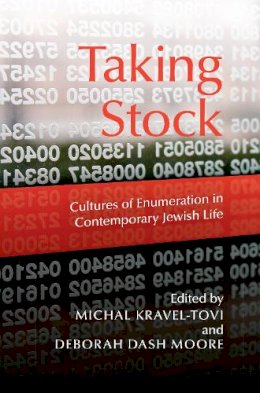7%OFF

Stock image for illustration purposes only - book cover, edition or condition may vary.
Taking Stock: Cultures of Enumeration in Contemporary Jewish Life
Michal Kravel-Tovi
€ 36.99
€ 34.27
FREE Delivery in Ireland
Description for Taking Stock: Cultures of Enumeration in Contemporary Jewish Life
paperback. Editor(s): Kravel-Tovi, Michal; Moore, Deborah Dash. Series: The Modern Jewish Experience. Num Pages: 274 pages, 12 b&w illus. BIC Classification: HRJ; JFSR1. Category: (G) General (US: Trade). Dimension: 5817 x 3887 x 18. Weight in Grams: 354.
Taking Stock is a collection of lively, original essays that explore the cultures of enumeration that permeate contemporary and modern Jewish life. Speaking to the profound cultural investment in quantified forms of knowledge and representation—whether discussing the Holocaust or counting the numbers of Israeli and American Jews—these essays reveal a social life of Jewish numbers. As they trace the uses of numerical frameworks, they portray how Jews define, negotiate, and enact matters of Jewish collectivity. The contributors offer productive perspectives into ubiquitous yet often overlooked aspects of the modern Jewish experience.
Product Details
Format
Paperback
Publication date
2016
Publisher
Indiana University Press United States
Number of pages
274
Condition
New
Series
The Modern Jewish Experience
Number of Pages
272
Place of Publication
Bloomington, IN, United States
ISBN
9780253020543
SKU
V9780253020543
Shipping Time
Usually ships in 7 to 11 working days
Ref
99-1
About Michal Kravel-Tovi
Michal Kravel-Tovi is Lecturer in the Department of Sociology and Anthropology at Tel Aviv University. Her work has appeared in American Ethnologist, Ethnic and Racial Studies, and the Journal of the Royal Anthropological Institute. Deborah Dash Moore is Frederick G. L. Huetwell Professor of History and Director of the Jean and Samuel Frankel Center for Judaic Studies at the ... Read more
Reviews for Taking Stock: Cultures of Enumeration in Contemporary Jewish Life
Taking Stock is...an important contribution to a Jewish conversation about how we understand who we are and how we put this knowledge to use. The editors are to be commended for curating this argument in a way that will provoke further discussion and new consideration of quantitative data about individuals and communities.
Contemporary Jewry
Contemporary Jewry
